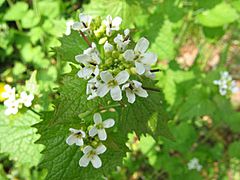Brassicales facts for kids
Quick facts for kids Brassicales |
|
|---|---|
 |
|
| Garlic Mustard (Alliaria petiolata) Family Brassicaceae |
|
| Scientific classification | |
| Kingdom: | |
| Division: | |
| Class: | |
| Subclass: | |
| (unranked): | |
| Order: |
Brassicales
|
| Families | |
|
See text. |
|
The Brassicales are a large group of flowering plants. Think of them like a big family tree for many plants you might know! This group includes plants like cabbage, mustard, and even papaya. They are part of a larger group called eurosids II, which are a type of dicotyledon. Scientists use systems like the APG II to organize these plant families.
Families in the Brassicales Order
The Brassicales order contains many different plant families. Here are some of the main ones:
- Family Akaniaceae
- Family Bataceae: These are shrubs that can grow in salty places. You can find them in America and Australasia.
- Family Brassicaceae: This is a very important family! It includes many plants we eat, like mustard plants and different kinds of cabbage.
- Family Capparaceae: This family includes the caper plant. Sometimes, scientists group it with the Brassicaceae family.
- Family Caricaceae: This family is famous for the papaya fruit.
- Family Gyrostemonaceae
- Family Koeberliniaceae
- Family Limnanthaceae: This is known as the meadowfoam family.
- Family Moringaceae: This family has thirteen types of trees. They grow in Africa and India.
- Family Pentadiplandraceae
- Family Resedaceae: This family includes plants like mignonette.
- Family Salvadoraceae
- Family Setchellanthaceae
- Family Tovariaceae
- Family Tropaeolaceae: This family is known for the colorful nasturtium flowers.
Images for kids
See also
 In Spanish: Brassicales para niños
In Spanish: Brassicales para niños

All content from Kiddle encyclopedia articles (including the article images and facts) can be freely used under Attribution-ShareAlike license, unless stated otherwise. Cite this article:
Brassicales Facts for Kids. Kiddle Encyclopedia.

